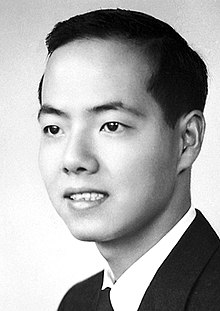T. D. Lee
| Tsung-Dao (T. D.) Lee 李政道 |
|
|---|---|

T. D. Lee, seen in 1956
|
|
| Native name | 李政道 (Lǐ Zhèngdào) |
| Born |
November 24, 1926 Shanghai, China |
| Fields | Physics |
| Institutions |
Columbia University Institute for Advanced Study University of California, Berkeley |
| Alma mater |
National Che Kiang University in Guizhou Province (dropped out) National Southwestern Associated University in Kunming (dropped out) University of Chicago |
| Thesis | Hydrogen Content of White Dwarf Stars (1950) |
| Doctoral advisor | Enrico Fermi |
| Known for |
Parity violation Non-topological solitons |
| Notable awards |
Nobel Prize in Physics (1957) Albert Einstein Award (1957) Matteucci Medal (1995) |
| Signature | |
Tsung-Dao Lee (T. D. Lee; Chinese: 李政道; pinyin: Lǐ Zhèngdào; born November 24, 1926) is a Chinese-American physicist, known for his work on parity violation, the Lee Model, particle physics, relativistic heavy ion (RHIC) physics, nontopological solitons and soliton stars. He holds the rank of University Professor Emeritus at Columbia University, where he has taught since 1953 and from which he retired in 2012.
In 1957, Lee, at the age of 30, won the Nobel Prize in Physics with Franklin C N Yang for their work on the violation of the parity law in weak interactions, which Chien-Shiung Wu experimentally verified in 1956, with her so-called Wu experiment.
Lee was the youngest Nobel laureate after World War II until Malala Yousafzai was awarded the Nobel Peace Prize in 2014. He is the fourth youngest Nobel laureate in history after William L. Bragg (who won the prize at 25 with his father William H. Bragg in 1915), Werner Heisenberg (who won in 1932 also at 30) and Malala Yousafzai (awarded at just 17). Lee and Yang were the first Chinese laureates. Since he became a naturalized American citizen in 1962, Lee is also the youngest American ever to have won a Nobel Prize.
...
Wikipedia

